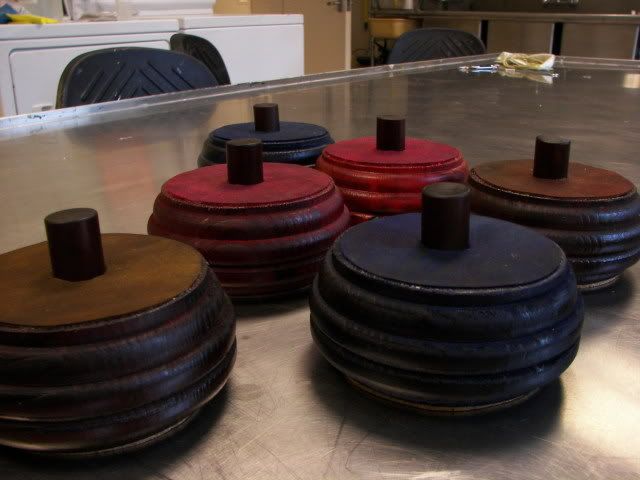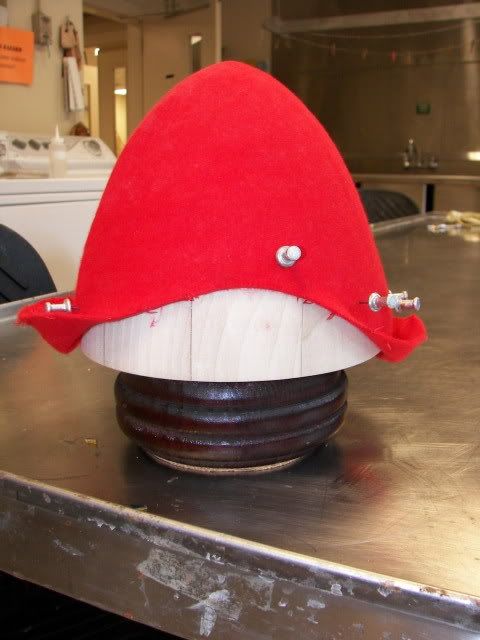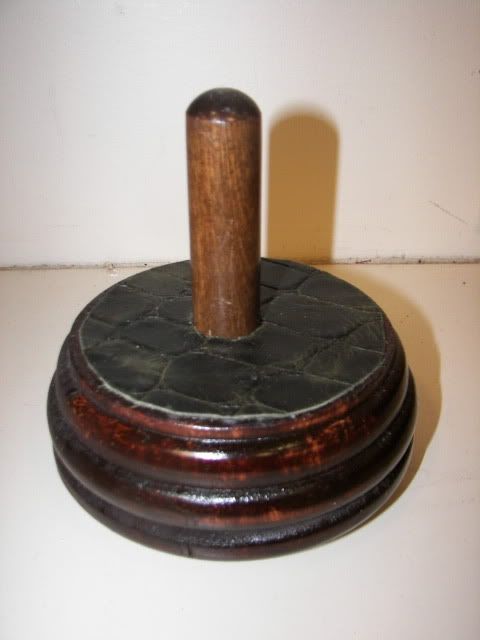Project: Making your own block spinner for millinery work
One useful tool for milliners--particularly those who block hats--is called a block spinner or head spinner. A spinner is basically a sturdy base with a peg which supports a dolly head or hat block while a milliner works, lifting it up and stabilizing it while allowing her/him to spin the block or dolly head around the peg for 360-degree access.
You can buy new block spinners ranging in design and price--the cheapest most utilitarian are little more than a dowel seated perpendicular in a piece of planking, whereas woodworking artisans like Mark DeCou do beautiful hand-turned, stained, carved bases with wooden or brass pegs. (You can see some images of DeCou Studio block spinners here.)
I just finished a batch of my own handmade spinners made from turned pine buns purchased at a woodworking shop. Pine buns are intended for use as feet for heavy furniture like bureaus and cabinets, and range in cost between $0.50-$5. You can get buns turned from other wood as well, like ash and poplar and walnut.
I stained each bun and covered the top with a leather pad, equipped it with a spinner post, and furnished it with a cork bottom.

Left: plain bun foot, as purchased
Right: Bun foot with post-hole
I drilled these post holes using a tabletop drill press fitted with a Forstner bit, which is a drill bit designed for making a flat-bottomed hole in a block of wood.

Bun feet can be stained with wood stain or dyes for cellulose fibers.

Finished batch of spinners.

Spinner "in action" with blocked felt shape.

Spinner supporting a dolly head.

Spinner with extra-long post for a top-heavy block of mine with a deep post-hole.
So, if you're interested in expanding your millinery equipment inventory and want a quick project that you can make for under $10, try your hand at your own spinners!
You can buy new block spinners ranging in design and price--the cheapest most utilitarian are little more than a dowel seated perpendicular in a piece of planking, whereas woodworking artisans like Mark DeCou do beautiful hand-turned, stained, carved bases with wooden or brass pegs. (You can see some images of DeCou Studio block spinners here.)
I just finished a batch of my own handmade spinners made from turned pine buns purchased at a woodworking shop. Pine buns are intended for use as feet for heavy furniture like bureaus and cabinets, and range in cost between $0.50-$5. You can get buns turned from other wood as well, like ash and poplar and walnut.
I stained each bun and covered the top with a leather pad, equipped it with a spinner post, and furnished it with a cork bottom.

Left: plain bun foot, as purchased
Right: Bun foot with post-hole
I drilled these post holes using a tabletop drill press fitted with a Forstner bit, which is a drill bit designed for making a flat-bottomed hole in a block of wood.

Bun feet can be stained with wood stain or dyes for cellulose fibers.

Finished batch of spinners.

Spinner "in action" with blocked felt shape.

Spinner supporting a dolly head.

Spinner with extra-long post for a top-heavy block of mine with a deep post-hole.
So, if you're interested in expanding your millinery equipment inventory and want a quick project that you can make for under $10, try your hand at your own spinners!